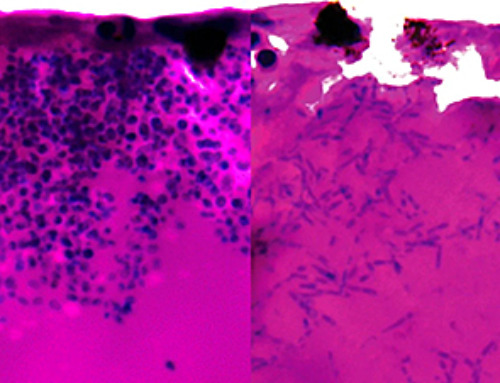A new study from Columbia researchers, in collaboration with scientists at the University of Hong Kong, adds more evidence that the omicron variant can evade the immune protection conferred by vaccines and natural infection and suggests the need for new vaccines and treatments that anticipate how the virus may soon evolve.
A striking feature of the omicron variant is the alarming number of changes in the virus’s spike protein that could pose a threat to the effectiveness of current vaccines and therapeutic antibodies.
Large drop in Omicron neutralization by antibodies from vaccines
The new study tested the ability of antibodies generated by vaccination to neutralize the omicron variant in laboratory assays that pitted antibodies against live viruses and against pseudoviruses constructed in the lab to mimic omicron.
Antibodies from people double-vaccinated with any of the four most widely used vaccines—Moderna, Pfizer, AstraZeneca, Johnson & Johnson—were significantly less effective at neutralizing the omicron variant compared to the ancestral virus. Antibodies from previously infected individuals were even less likely to neutralize omicron.
Individuals who received a booster shot of either of the two mRNA vaccines are likely to be better protected, although even their antibodies exhibited diminished neutralizing activity against omicron.
“The new results suggest that previously infected individuals and fully vaccinated individuals are at risk for infection with the omicron variant,” says Ho. “Even a third booster shot may not adequately protect against omicron infection, but of course it is advisable to get one, as you’ll still benefit from some immunity.”
The results are consistent with other neutralization studies, as well as early epidemiological data from South Africa and the U.K., which show efficacy of two doses of the vaccines against symptomatic disease is significantly reduced against the omicron variant.
Most monoclonal antibodies are unable to neutralize Omicron
When administered early in the course of infection, monoclonal antibodies can prevent many individuals from developing severe COVID. But the new study suggests that all of the therapies currently in use and most in development are much less effective against omicron, if they work at all.
In neutralization studies with monoclonal antibodies, only one (Brii198 approved in China) maintained notable activity against omicron. A minor form of omicron is completely resistant to all antibodies in clinical use today. The authors note that omicron is now the most complete “escapee” from neutralization that scientists have seen.
In this study Ho’s lab also identified four new spike mutations in omicron that help the virus evade antibodies. This information should inform the design of new approaches to combat the new variant.
Future directions
Ho suggests that scientists will need to develop vaccines and treatments that can better anticipate how the virus is evolving.
“It is not too far-fetched to think that SARS-CoV-2 is now only a mutation or two away from being completely resistant to current antibodies, either the monoclonal antibodies used as therapies or the antibodies generated by vaccination or infection with previous variants,” says Ho.
News
Scientists Unlock a New Way to Hear the Brain’s Hidden Language
Scientists can finally hear the brain’s quietest messages—unlocking the hidden code behind how neurons think, decide, and remember. Scientists have created a new protein that can capture the incoming chemical signals received by brain [...]
Does being infected or vaccinated first influence COVID-19 immunity?
A new study analyzing the immune response to COVID-19 in a Catalan cohort of health workers sheds light on an important question: does it matter whether a person was first infected or first vaccinated? [...]
We May Never Know if AI Is Conscious, Says Cambridge Philosopher
As claims about conscious AI grow louder, a Cambridge philosopher argues that we lack the evidence to know whether machines can truly be conscious, let alone morally significant. A philosopher at the University of [...]
AI Helped Scientists Stop a Virus With One Tiny Change
Using AI, researchers identified one tiny molecular interaction that viruses need to infect cells. Disrupting it stopped the virus before infection could begin. Washington State University scientists have uncovered a method to interfere with a key [...]
Deadly Hospital Fungus May Finally Have a Weakness
A deadly, drug-resistant hospital fungus may finally have a weakness—and scientists think they’ve found it. Researchers have identified a genetic process that could open the door to new treatments for a dangerous fungal infection [...]
Fever-Proof Bird Flu Variant Could Fuel the Next Pandemic
Bird flu viruses present a significant risk to humans because they can continue replicating at temperatures higher than a typical fever. Fever is one of the body’s main tools for slowing or stopping viral [...]
What could the future of nanoscience look like?
Society has a lot to thank for nanoscience. From improved health monitoring to reducing the size of electronics, scientists’ ability to delve deeper and better understand chemistry at the nanoscale has opened up numerous [...]
Scientists Melt Cancer’s Hidden “Power Hubs” and Stop Tumor Growth
Researchers discovered that in a rare kidney cancer, RNA builds droplet-like hubs that act as growth control centers inside tumor cells. By engineering a molecular switch to dissolve these hubs, they were able to halt cancer [...]
Platelet-inspired nanoparticles could improve treatment of inflammatory diseases
Scientists have developed platelet-inspired nanoparticles that deliver anti-inflammatory drugs directly to brain-computer interface implants, doubling their effectiveness. Scientists have found a way to improve the performance of brain-computer interface (BCI) electrodes by delivering anti-inflammatory drugs directly [...]
After 150 years, a new chapter in cancer therapy is finally beginning
For decades, researchers have been looking for ways to destroy cancer cells in a targeted manner without further weakening the body. But for many patients whose immune system is severely impaired by chemotherapy or radiation, [...]
Older chemical libraries show promise for fighting resistant strains of COVID-19 virus
SARS‑CoV‑2, the virus that causes COVID-19, continues to mutate, with some newer strains becoming less responsive to current antiviral treatments like Paxlovid. Now, University of California San Diego scientists and an international team of [...]
Lower doses of immunotherapy for skin cancer give better results, study suggests
According to a new study, lower doses of approved immunotherapy for malignant melanoma can give better results against tumors, while reducing side effects. This is reported by researchers at Karolinska Institutet in the Journal of the National [...]
Researchers highlight five pathways through which microplastics can harm the brain
Microplastics could be fueling neurodegenerative diseases like Alzheimer's and Parkinson's, with a new study highlighting five ways microplastics can trigger inflammation and damage in the brain. More than 57 million people live with dementia, [...]
Tiny Metal Nanodots Obliterate Cancer Cells While Largely Sparing Healthy Tissue
Scientists have developed tiny metal-oxide particles that push cancer cells past their stress limits while sparing healthy tissue. An international team led by RMIT University has developed tiny particles called nanodots, crafted from a metallic compound, [...]
Gold Nanoclusters Could Supercharge Quantum Computers
Researchers found that gold “super atoms” can behave like the atoms in top-tier quantum systems—only far easier to scale. These tiny clusters can be customized at the molecular level, offering a powerful, tunable foundation [...]
A single shot of HPV vaccine may be enough to fight cervical cancer, study finds
WASHINGTON -- A single HPV vaccination appears just as effective as two doses at preventing the viral infection that causes cervical cancer, researchers reported Wednesday. HPV, or human papillomavirus, is very common and spread [...]





















